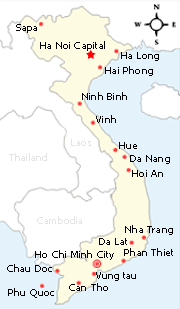|
A politician’s pagoda
Thankfully Cau Dong pagoda is still standing, proudly ignoring the sights and sounds of the 21st century. Built nearly 1,000 years ago under the direction of the Ly Dynasty (1010-1125), when Buddhism came to the fore in Vietnam, the pagoda is also known as Dong Mon or Dong Kieu Tu (The Pagoda facing West), a name that referenced the famous bridge crossing over the To Lich River by the Thang Long Citadel’s Eastern Gate. But in the late 19th century that section of the To Lich River running through the city’s old quarter was filled in and covered up. The pagoda has undergone five overhauls (the latest one in 2000-2004) due to serious degradation. But we can still see evidence of the Ly Dynasty’s architects although the overall design was refashioned under the Nguyen Dynasty (1802-1945AD). The pagoda is home to a number of 400-year-old statues, stone stelae and a copper bell made in 1800AD. To the left of the pagoda is Duc Mon communal house, which worships Ngo Van Long, a talented and successful general, who served under the Tran Dynasty. Cau Dong Pagoda is the sole pagoda in Hanoi dedicated to Tran Thu Do (1194-1264AD), an eminent general-cum-advisor under the Ly Dynasty, who orchestrated the demise of the Ly Dynasty and the beginning of the Tran Dynasty through shrewd political maneuvering. He persuaded King Ly Hue Tong (1211-1225) to marry off his daughter, and heir-to-the-throne, Ly Chieu Hoang to Tran Thu Do’s nephew Tran Canh, when they both just seven years old. Ly Chieu Hoang quickly yielded the throne to her husband, who thus became the official Emperor of Vietnam, and founder of the Tran Dynasty (1225-1400), while Tran Thu Do assumed the role of Prime Minister, and effectively ruled the country, as his nephew was only seven. The transfer of power between the two dynasties took place without bloodshed, testament to Tran Thu Do’s political guile. During his proxy rule, he wasted little time by enacting major civil reforms, including the division of the Vietnamese kingdom into 12 provinces and the institution of various taxes on land holdings and transactions. He was also responsible for brokering a peaceful settlement with Mongol invaders from the north. Despite the fact he’d wrested control of the country without shedding blood, he did secure the new Tran Dynasty by wiping out as many family members of the previous Ly Dynasty as possible. Those who survived did so in hiding or in exile. Prince Ly Long Tuong was one exile who later became a national hero in Korea for defeating the Mongols. In 1226, Tran Thu Do then married his cousin Tran Thi Dung, the former wife of Ly Hue Tong, who was later declared to be Linh Tu Quoc Mau (Mother of the nation) because of her great contributions to the court as well as her military strategies. In January 1258, when the Chinese Yuan and Mongol invaders encroached on Vietnamese soil for the first time, Tran Thu Do calmly told the king that: “Your Majesty, you should not be anxious as my head remains!” In the heat of the moment, his famous statement held true as he masterminded a famous victory in only 10 days. Feudal historical texts often considered him a talented but immoral courtier. But his rise to power is undoubtedly a captivating story. In order to celebrate the 1000th grand anniversary of Thang Long-Hanoi as Vietnam’s capital, the Vietnam Feature Film Studio 1 is making a VND48 billion ($2.66 million) film about Tran Thu Do. VietNamNet/Time-out Other news for Tuesday 18 August, 2009
View all news for Tuesday 18 August, 2009 on one page News for Monday 17 August, 2009 View all news for Monday 17 August, 2009 on one page Recent News
|










